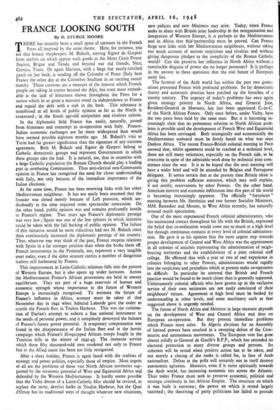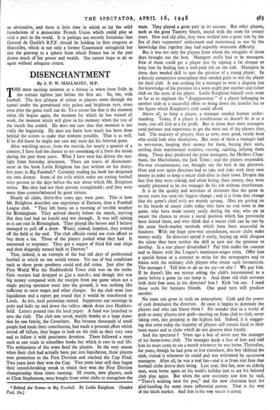FRANCE LOOKING SOUTH
By D. STURGE MOORE
THERE has recently been a small spate of cartoons in the French Press all inspired by the same theme. Here, for instance, you see that honest shopkeeper, M. Bidault, serving Signor de Gasperi from shelves on which appear such goods as the Mont Cenis Power
Station, Brigue and Tenda and beyond our old friends, Nice, Corsica, Tunis. Or again Mariana, with a large but neatly-stitched patch on her back, is sending off the Colombe of Peace (Italy beat France the other day at the Colombes Stadium in an exciting soccer match). These cartoons are a measure of the interest which French people are taking in events beyond the Alps, but even more remark- able is the lack of bitterness shown throughout the Press for a nation which in so great a measure owed its independence to France and repaid the debt with a stab in the back. This tolerance is manifested at all levels of public opinion as far as the North is concerned ; in the South age-old antipathies and rivalries subsist.
In the diplomatic field France has easily, naturally, passed from bitterness and contempt to co-operation with Italy. Franco- Italian economic exchanges are far more widespread than would have seemed possible eighteen months ago. M. Bidault's visit to Turin had far greater significance than the signature of any customs agreement. Both M. Bidault and Signor de Gasperi belong to Catholic democratic groups and represent Governments in which these groups take the lead. It is natural, too, that in countries with a large Catholic population the Roman Church should play a leading part in combating Communism. Thus anti-clerical non-Communist opinion in France has recognised the need for closer understanding with Italy, not only because of the immediate importance of the Italian elections.
At the same time, France has been renewing links with her other Mediterranean neighbour. It has too easily been assumed that the frontier was closed merely because of Left pressure, which un- doubtedly at the time required some spectacular concession. On the other hand, public opinion was and remains profoundly hostile to Franco's regime. Two years ago France's diplomatic prestige was very low ; Spain was one of the few spheres in which initiative could be taken with the full backing of public opinion. The failure of this initiative would be more ridiculous had not M. Bidault since then continuously increased the diplomatic prestige of his country. Thus, whatever one may think of the past, France reopens relations with Spain in a far stronger position than when she broke them off. French investments in the Peninsula, too, represent a very tangible asset today, even if the debit account carries a number of dangerous traitors still harboured by Franco.
This improvement in Latin-Catholic relations falls into the pattern of Western Europe, but it also opens up wider horizons. Across the Mediterranean France's African possessions are held in uneasy equilibrium. They are part of a huge reservoir of human and economic strength whose importance to the future of Western Europe is increasingly recognised. To estimate the future of France's influence in Africa, account must be taken of that November day in 1942 when Admiral Laborde gave the order to scuttle the French fleet in Toulon Harbour. This was the culmina- tion of Darlan's attempt to suborn a fine national instrument to the needs of personal power, and it completely destroyed the balance of France's future power potential. A temporary compensation was found in the disappearance of the Italian fleet and in the heroic campaign which France's ill-equipped African troops fought in the Tunisian hills in the winter of 1942-43. The immense service which these fifty thousand-odd men rendered not only to France but to the Allied cause has been too little recognised.
After a short holiday, France is again faced with the realities of strategy and power politics, especially those of empire. Most urgent of all are the problems of those vast North African territories sup- ported by the economic potential of West and Equatorial Africa and defended by the Western Mediterranean. It hardly seems possible that the Vichy dream of a Latin-Catholic bloc should be revived, to replace the rusty, derelict hulks in Toulon Harbour, but the Quai d'Orsay has its traditional ways of thought whatever new situations, new policies and new Ministers may arise. Today, when France seeks to share with Britain joint leadership in the reorganisation and integration of Western Europe, it is perhaps in the Mediterranean and in Africa that thisL'partnership must be proved. Can France forge new links with her Mediterranean neighbours, without taking too much account of ancient suspicions and rivalries and without giving dangerous pledges' to the complicity of the Roman Catholic world? Can she preserve her influence in North Africa without a ramshackle disguise of power she no longer possesses? It is perhaps in the answer to these questions that the real future of European unity lies.
The ferment of the Arab world has within the past two gener- ations presented France with profound problems. So far democratic theory and autocratic practice have patched up the breaches of a stormy century. The urgency of today's problems has once again given strategy priority in North Africa, and General Juin, Resident-General in Morocco, has just been appointed C.-in-C. of the North African Forces. Only once before, under Vichy, have the two posts been held by the same man. But it is becoming in- creasingly clear that no permanent solution to North African prob- lems is possible until the development of French West and Equatorial Africa has been envisaged. Both strategically and economically the Mediterranean seaboard must be firmly based on what was once Darkest Africa. The recent Franco-British colonial meeting in Paris snowed that, whilst agreement could be reached at a technical level, there are still many reticences, especially on the French side, to be overcome in spite of the admirable work done by technical joint com- mittees since the war. It is to be hoped that the next meeting will have a wider brief and will be attended by Belgian and Portuguese delegates. It seems certain that at the present time Britain alone is giving this problem sufficient attention, which may well explain, if not justify, reservations by other Powers. On the other hand, American interest and economic infiltration into this part of the world is becoming increasingly apparent. The officially " fortuitous " meeting between Mr. Stettinius and two former Socialist Ministers, MM. Ramadier and Moutet, in West Africa recently, has naturally aroused much speculation.
One of the most experienced French colonial administrators, who has maintained contact throughout his life with the British, expressed the belief that co-ordination would come not so much at a high level but through continuous contacts at every level of colonial administra- tion. He gave it as his opinion that the most urgent step towards proper development of Central and West Africa was the appointment in all colonies of attaches representing the administration of neigh- bouring territories and the establishment of a joint colonial staff college. He affirmed that with a year or two of real experience in colonies belonging to other Powers, administrators would rapidly lose the suspicions and prejudices which at present make co-operation so difficult. In particular he asserted that British and French practice would be found to be much closer than is generally supposed. Unfortunately colonial officials who have grown up in the exclusive service of their own territories are not easily convinced of their neighbours' virtues. Agreement at high level must be backed by understanding at other levels, and some machinery such as that suggested above is urgently needed.
The future of North Africa and Morocco in large measure depends on the development of West and Central Africa and thus on European co-operation. But they present immediate problems which France must solve. In Algeria elections for an Assembly of limited powers have resulted in a sweeping defeat of the Com- munist and autonomous movements. The European vote has gone almost solidly to General de Gaulle's R.P.F., which has extended its electoral protection to many diverse groups and persons. Its cohesion will be tested when positive action has to be taken, and not merely a closing of the ranks is called for, in face of Arab nationalism. Defeat at the polls will certainly not in itself destroy autonomist agitation. Morocco, even if it turns spiritually towards the Arab world, has increasing economic ties across the Atlantic. Thus today France mast seek to preserve economic, political and strategic continuity in her African Empire. The structure on which it was built is outworn ; the power on which it rested largely vanished ; the theorising of party politicians has failed to provide an alternative, and there is little time in which to lay the solid foundations of a democratic French Union which could play so vital a part in the world. It is perhaps not entirely fortuitous that General de Gaulle's R.P.F. should be holding its first congress at Marseilles, which is not only a former Communist stronghold but also the gateway to a sphere from which France has in the past drawn much of her power and wealth. She cannot hope to do so again without adequate return.































 Previous page
Previous page